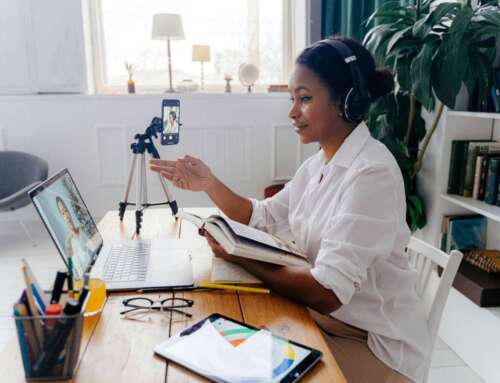We all know that stress impacts sexual desire and, on a global scale, we are all feeling stress associated with the global pandemic. The lockdown has not ended for many parts of the world, and we are really starting to feel the effects of long-term isolation.
The work of sex coaching is a vital service during times like these. Pleasure is a human right and, as sex coaches, we work to help our communities through the impacts of this crisis on their sexual health.
Many of our clients may be experiencing low desire in lockdown. Perhaps they are isolating themselves and being kept from romantic partners. Some people who are quarantined with their long term partner are feeling stress in their relationship. For others, maybe everything has become too much and they are feeling disconnected from their body entirely.
Whatever the case, as sex coaches, our work involves supporting our clients through their difficult circumstances. In previous articles, we discussed dating during covid-19, and how pleasure products can help in isolation. This article will focus on tools that can be used to support clients who are experiencing low desire in lockdown.
Responsive vs. Spontaneous Desire
Often our clients come into our sex coaching practice with preconceived and sometimes inaccurate ideas about sex drive and desire. They often think of the desire to have sex as a biological drive. This is true but only partly. Desire for sex is actually much more complicated and nuanced. For example, we can experience responsive or spontaneous desire. When someone feels “turned on” suddenly and out of the blue — we call this spontaneous desire. Responsive desire happens when the sexual act comes first, and the desire second.
You can think of spontaneous desire as feeling mentally turned on first, and physically turned on next. Responsive desire is when you feel physically turned on first, and the mental desire follows. The sexual desire is responsive to the erotic stimulation. Cultural messages would have us believe that we should always be mentally turned on and ready (experiencing spontaneous desire), but the truth is—many people primarily experience responsive desire and this is perfectly normal.
If your client’s “desire style” is responsive, you can help them cultivate their experiences with this new understanding. Have them make a list of arousing activities that don’t include their genitals. A vulnerable conversation that makes them feel connected to their partner, a weekend getaway, or cooking a meal together are a few examples. The idea is to identify the things that put them in a relaxed and open state, so that the desire can build without performance pressure.
Helping your clients understand the different ways we can experience desire can help them better understand a desire fluctuation during lockdown. Pairing this explanation with the energy of self-acceptance can help clients feel less “broken” and shift into a more proactive and solution-based space.
Stress and Sex

Photo by Spencer Selover from Pexels
Stress impacts sexual desire differently for each of us. It is largely influenced by a combination of biological “wiring” and our life experiences. The context of our life circumstances plays a huge role in the determination of our sexual desire. This is why fluctuations are so normal and prevalent. This is also why we can see a correlation between the global lockdowns and the pervasive lack of sexual desire.
Some of our clients will feel a complete depletion of sexual desire during times of stress. We know this is normal! Other clients will feel a significant increase, which can sometimes leave them feeling “out of control.” We know this is normal, too!
Every client’s experiences with stress and with desire will be unique, and it’s important to help them come up with strategies that work best for them to both mitigate their stress and enhance their desire levels.
One solution is to help your client come up with a practical strategy for incorporating radical self care into their lifestyle. Maybe that looks like intentionally taking things off of their plate and adjusting their schedule to establish more free time. Or it could look like picking up a relaxing creative activity or beginning a meditation practice.
Radical self care during this time of chaos can open and relax your client’s body and mind, returning them to a state of equilibrium, which is much more conducive to sexual desire.
It’s also important to give your client permission to accept whatever level of sexual desire they may be feeling right now, reassuring them that this is normal. You can explain how their sexual desire may fluctuate and explore with them all the variables that can give them a “context” for understanding their unique sexual desire. Guide them in introspection practices and how to cultivate a sense of curiosity to replace feelings of inadequacy. . Helping them learn how to focus on things they can control instead of things they can’t may be key to making adjustments in their mindset..
Our clients can’t control all of the craziness this year has brought to the whole world, but we can help them find joy and pleasure amidst the chaos.
Curious about training to become a Certified Sex Coach™? Join the next live Info Session to meet the SCU team and participate in a live Q&A!







